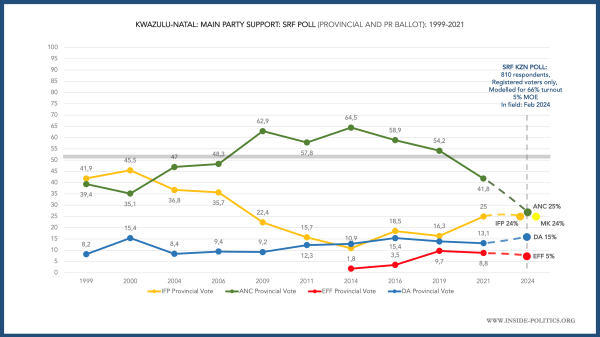Immediate takeaways from the latest SRF KZN poll
13 February 2024
Some quick thoughts on the latest Social Research Foundation poll in KwaZulu-Natal.
Disclaimer: Victory Research conducted the poll, and I am CEO of Victory Research.
Just to get the methodology out the way: The survey was conducted by phone, using a single-frame Random Digit Dialling sampling method. It has a margin of error of 5% at a confidence level of 95%. The sample comprised 810 registered KZN voters, and was weighted to be fully demographically representative of the KZN voting population (by age, gender, income, language, education, rural/urban etc). Undecided voters have been allocated using other thermometers in the poll. The results have been modelled for a 66% turnout scenario. These results are for a provincial ballot question, a national ballot question was tested too, but those results are not public.
Below is a table that maps the SRF poll results onto the performance of all the big KZN parties for each provincial and local election since 1999 (using the provincial and PR ballot).

A few observations.
At 66% turnout and using the IEC’s latest registered voters national total, MK’s 24% on the KZN provincial ballot translates to 4,98% nationally.
However, if MK is on 24% or thereabouts in KZN, you can be sure it on at least 5% in Gauteng. So 5% nationally is conservative.
The bulk of MK’s support seems to have come from the ANC (on 54,2% in 2019), which is down a staggering 29,2pts to 25%.
But it has also likely halved the EFF’s support (down from 8,8% to 5%) and slowed the IFP’s growth, so that it levels out at 24% from 2021. Viewed from a 2019 perspective it is really only the EFF that has suffered (down 4,7pts) while the IFP still looks set to grow somewhat.
If these numbers hold, this result is as bad for the EFF as it is the ANC. KZN is the province where 33% of EFF growth came from in 2019. Because it is such a populous province, if the EFF goes backwards here, it will severely hurt its national percentage.
So nationally MK will likely damage, in this order, the ANC, EFF and IFP.
It is likely MK’s support is growing, although the rate might slow. And its potential in KZN is likely higher than the 24% it is currently on.
The DA seems largely uneffected.
The fact that MK still scores 24% on a 66% turnout suggests its supporters are committed. These are people with a purpose and a desire to vote. MK seems to hold up better, for example, than the EFF which, because many of its voters are angry, protest voters, typically loses some support in lower turnout scenarios.
We need more polling to properly understand MK, to get a full read on its potential and to establish how well it can hold its current support levels, but even with those caveats, 24% is a deeply significant number and, however constrained this initial read, you can be sure the party is going to profoundly impact the KZN electoral landscape.
In turn, MK’s impact on the national landscape will likely be no less profound, we know less about its national impact. A “secret” poll reported on by Rapport this weekend put MK on 9% nationally. That would more or less tally with the SRF’s KZN poll.
It is worth noting that, combined, the ANC, MK and EFF comprise 53% going by the SRF’s numbers. So, in the grand analysis, and ignoring the slight differences in policy emphasis and ideology, there has been no fundamental shift in the outlook of the majority of KZN voters, even if those parties have fractured in terms of intensity and chosen personality.
All numbers in this essay are drawn from the Independent Electoral Commission website: https://www.elections.org.za/pw/
This essay is the 10th in an on-going series on Election 2024, for all other editions of this series, please click here: Election 2024

